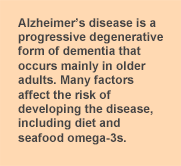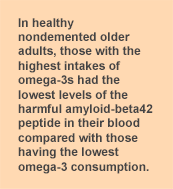
Alzheimer’s disease is a progressive and debilitating form of dementia in which brain tissue is gradually destroyed (Figure). It occurs most frequently among older adults. In the U.S., 1 in 8 people aged 65 and older—about 5.4 million Americans of all ages—have the condition. With people living longer, this number is expected to treble by the year 2050. Right now, there is no cure or effective treatment for the disease, although various medications are used to improve memory and functionality. What determines whether a person will develop Alzheimer’s disease? The condition has no single cause, but is more likely to develop in individuals with mildly impaired cognition, depressive symptoms, insulin resistance and a mutation in the apolipoprotein E gene for the ε4 allele. It has also been observed that individuals who consume a
Mediterranean diet have a lower risk of the disease, lower mortality from it and slower rates of cognitive decline. The consumption of fish and shellfish or having high levels of the omega-3 fatty acid DHA in the blood is also linked to a lower chance of developing the disease. However, providing DHA to those with the early signs of Alzheimer’s disease has not been able to slow or halt the progression of the disease. How might DHA or seafood omega-3s protect against Alzheimer’s disease? Considerable research has found that DHA protects neurons from damage and destruction and from harmful metabolic products associated with the disease. Studies in animals suggest that DHA might affect the production of the abnormal amyloid-beta peptides characteristic of the disease. In this article, Nikos Scarmeas and his research group at Columbia University, USA, describe the association between seafood omega-3 consumption and levels of two abnormal amyloid-beta proteins in blood in older adults who did not have symptoms of dementia. The investigators collected dietary information and blood samples from over 1,200 adults living in New York City who average

d 75 years of age. They assessed the participants’ consumption of omega-3 and omega-6 fatty acids and measured the concentrations of two abnormal peptides, amyloid-beta40 and amyloid-beta42, characteristic of Alzheimer’s disease. They observed that those with the highest intakes of omega-3 fatty acids had the lowest levels of both amyloid-beta proteins. When they took into consideration other possible confounding variables, only the amyloid-beta42 peptide decreased as omega-3 intakes increased. This peptide is believed to be the more harmful of the two. These observations, if confirmed by others, suggest that higher intakes of omega-3 fatty acids might reduce the production of the most damaging type of beta-amyloid protein. However, because this study describes an association, it cannot show that omega-3 consumption caused the reduced amyloid-beta42 production. It is noteworthy that these abnormal proteins were present in the blood of patients who had no other symptoms of Alzheimer’s disease.
 Alzheimer’s disease is a progressive and debilitating form of dementia in which brain tissue is gradually destroyed (Figure). It occurs most frequently among older adults. In the U.S., 1 in 8 people aged 65 and older—about 5.4 million Americans of all ages—have the condition. With people living longer, this number is expected to treble by the year 2050. Right now, there is no cure or effective treatment for the disease, although various medications are used to improve memory and functionality. What determines whether a person will develop Alzheimer’s disease? The condition has no single cause, but is more likely to develop in individuals with mildly impaired cognition, depressive symptoms, insulin resistance and a mutation in the apolipoprotein E gene for the ε4 allele. It has also been observed that individuals who consume a Mediterranean diet have a lower risk of the disease, lower mortality from it and slower rates of cognitive decline. The consumption of fish and shellfish or having high levels of the omega-3 fatty acid DHA in the blood is also linked to a lower chance of developing the disease. However, providing DHA to those with the early signs of Alzheimer’s disease has not been able to slow or halt the progression of the disease. How might DHA or seafood omega-3s protect against Alzheimer’s disease? Considerable research has found that DHA protects neurons from damage and destruction and from harmful metabolic products associated with the disease. Studies in animals suggest that DHA might affect the production of the abnormal amyloid-beta peptides characteristic of the disease. In this article, Nikos Scarmeas and his research group at Columbia University, USA, describe the association between seafood omega-3 consumption and levels of two abnormal amyloid-beta proteins in blood in older adults who did not have symptoms of dementia. The investigators collected dietary information and blood samples from over 1,200 adults living in New York City who average
Alzheimer’s disease is a progressive and debilitating form of dementia in which brain tissue is gradually destroyed (Figure). It occurs most frequently among older adults. In the U.S., 1 in 8 people aged 65 and older—about 5.4 million Americans of all ages—have the condition. With people living longer, this number is expected to treble by the year 2050. Right now, there is no cure or effective treatment for the disease, although various medications are used to improve memory and functionality. What determines whether a person will develop Alzheimer’s disease? The condition has no single cause, but is more likely to develop in individuals with mildly impaired cognition, depressive symptoms, insulin resistance and a mutation in the apolipoprotein E gene for the ε4 allele. It has also been observed that individuals who consume a Mediterranean diet have a lower risk of the disease, lower mortality from it and slower rates of cognitive decline. The consumption of fish and shellfish or having high levels of the omega-3 fatty acid DHA in the blood is also linked to a lower chance of developing the disease. However, providing DHA to those with the early signs of Alzheimer’s disease has not been able to slow or halt the progression of the disease. How might DHA or seafood omega-3s protect against Alzheimer’s disease? Considerable research has found that DHA protects neurons from damage and destruction and from harmful metabolic products associated with the disease. Studies in animals suggest that DHA might affect the production of the abnormal amyloid-beta peptides characteristic of the disease. In this article, Nikos Scarmeas and his research group at Columbia University, USA, describe the association between seafood omega-3 consumption and levels of two abnormal amyloid-beta proteins in blood in older adults who did not have symptoms of dementia. The investigators collected dietary information and blood samples from over 1,200 adults living in New York City who average d 75 years of age. They assessed the participants’ consumption of omega-3 and omega-6 fatty acids and measured the concentrations of two abnormal peptides, amyloid-beta40 and amyloid-beta42, characteristic of Alzheimer’s disease. They observed that those with the highest intakes of omega-3 fatty acids had the lowest levels of both amyloid-beta proteins. When they took into consideration other possible confounding variables, only the amyloid-beta42 peptide decreased as omega-3 intakes increased. This peptide is believed to be the more harmful of the two. These observations, if confirmed by others, suggest that higher intakes of omega-3 fatty acids might reduce the production of the most damaging type of beta-amyloid protein. However, because this study describes an association, it cannot show that omega-3 consumption caused the reduced amyloid-beta42 production. It is noteworthy that these abnormal proteins were present in the blood of patients who had no other symptoms of Alzheimer’s disease.
d 75 years of age. They assessed the participants’ consumption of omega-3 and omega-6 fatty acids and measured the concentrations of two abnormal peptides, amyloid-beta40 and amyloid-beta42, characteristic of Alzheimer’s disease. They observed that those with the highest intakes of omega-3 fatty acids had the lowest levels of both amyloid-beta proteins. When they took into consideration other possible confounding variables, only the amyloid-beta42 peptide decreased as omega-3 intakes increased. This peptide is believed to be the more harmful of the two. These observations, if confirmed by others, suggest that higher intakes of omega-3 fatty acids might reduce the production of the most damaging type of beta-amyloid protein. However, because this study describes an association, it cannot show that omega-3 consumption caused the reduced amyloid-beta42 production. It is noteworthy that these abnormal proteins were present in the blood of patients who had no other symptoms of Alzheimer’s disease.

